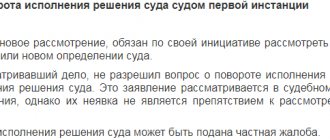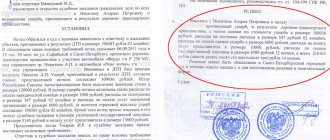In the process of judicial enforcement of a court decision, one of the parties (plaintiff, defendant) or the bailiff have the right to petition for a change in the method of execution of the court decision. This is a standard situation that often happens after a trial, already at the stage of enforcement proceedings - the defendant cannot comply with the decision of the higher authority within the prescribed time frame for some reason that could not be foreseen when the final judicial act was issued in the case.
ATTENTION : an option to change something during the execution of a court decision may be a deferment or installment plan for the execution of executive documents (more on this in the link). Typically, this is used by debtors whose property situation does not allow them to make the awarded payment on time, and who do not want to lose property that falls under arrest.
What is a bailiff service?
This organization is engaged in the enforcement of decisions that were made during legal proceedings against debtors. Most often, these organizations are located in each city. The exact location of the organization can be found out by contacting the court office.
Thus, after the end of the trial, the debtor is issued a writ of execution to enforce the decisions made.
However, if the debtor makes a request to redirect this paper, then the court sends this decision to the bailiff service independently.
If such a petition has not been received, then the debtor receives the papers in person or it is sent to him by registered mail.
Who are bailiffs?
During the trial, two persons are appointed: the debtor and the claimant. The collector is the bailiffs who administer justice and act on behalf of the state. He must perform his duties clearly and in accordance with the rights and obligations of the debtor.
If the debtor considers that his rights were somehow infringed by the bailiff, then he can file a complaint against the bailiff and recognize his actions as unlawful.
Duties of a bailiff
1. Provide all available materials on the case to other parties;
2. Draw up various extracts on the case or make photocopies of them;
3. Consider applications from both parties and petitions submitted by them;
4. Make decisions on the case, explain the deadlines and the procedure for appealing them;
5. Takes measures that are necessary for the correct, timely execution of court decisions;
6. Conduct consultations and conversations with both parties, listen to their opinions.
To obtain various information, bailiffs call the debtor.
Bailiff's rights
Let's consider the basic rights that the bailiff has the right to demand from the parties involved in the case for the correct execution of enforcement actions.
These include:
• Receive all the information, explanations, certificates, and evidence necessary for the case;
• Check accounting documents;
• Seize property owned by the debtor. This category also includes various bank deposits and a citizen’s travel abroad.
In addition, the bailiff has the right to come to the debtor at any time convenient for the specialist, without coordinating it with the debtor.
Usually bailiffs call the debtor. However, if there is no debtor on the premises, the bailiff must leave immediately.
The procedure for collecting funds by bailiffs
1. Initially, on the basis of the received documents, he initiates enforcement proceedings. It should be remembered that the debtor can repay the existing debt within a week;
2. If funds are missing for a long time, then the next step is to inventory and seize property, bank accounts, and collect funds from the debtor’s wages. Bailiffs usually call banks and the debtor's work place;
3. In the absence of money, the debtor is subject to a fine for free movement.
Also, the debtor is constantly called on his home phone and demanded to pay the necessary funds. However, most often these issues are dealt with by collectors.
General rules on deadlines for execution of court decisions
Specific deadlines for the execution of certain judicial acts are provided for by the norms of the relevant procedural code. The deadlines for the compulsory execution of court decisions are established by executive legislation, in particular the Law on Enforcement Proceedings. In this regard, it is customary to distinguish:
- The period for execution of a court decision is the period established by procedural law during which the decision must be executed voluntarily. This period begins:
- immediately – for judicial acts that immediately come into force;
- after the expiration of the period established by the procedural law - for judicial acts that come into force after the expiration of the appeal period;
- upon expiration of the period established by the court decision itself or a court decision to defer execution.
- The period for compulsory execution of a court decision (the statute of limitations for applying for enforcement of a court decision) is the period established by executive legislation. Depending on the type of decision, this period begins to run, either at the time it enters into force or at the time the court decision is issued.
Time limit for execution of a court decision by a bailiff
According to Federal Law, all decisions made by the court must be executed within 2 months.
It should also be remembered that all orders from bailiffs, which record the execution of individual enforcement actions, are carried out within 15 days from the date of receipt by the bailiff service.
Immediate enforcement actions must be carried out for the first time within days of the receipt of all documents on the case by the service.
It should be remembered that if the decision needs to be executed urgently, then the debtor is issued a writ of execution immediately after the trial.
Court orders and court decisions required for immediate execution:
- Collection of alimony;
- Payment of wages to the debtor. Typically it must be paid within 3 months;
- The procedure for reinstating the debtor at work;
- Adding a person to the list of voters or participants in international events.
These decisions must be executed immediately and cannot be appealed by the debtor.
If the bailiff violates the deadlines for the execution of court decisions, then, according to the law of the Russian Federation, no penalties or sanctions are provided for them.
It should also be remembered that the end of the deadline is not a reason to terminate enforcement proceedings.
Deadline for debt collection under a writ of execution
To find out how long bailiffs can collect a debt under a writ of execution, you need to understand what kind of document it is and how to get it?
A writ of execution is a document on the basis of which proceedings of the same name begin. The presence of this paper gives a person the opportunity to contact the federal bailiff service and enforce the collection of alimony or other debts.
A court proceeding that ends in favor of the plaintiff allows the commencement of collection under a writ of execution. To obtain this act, you must contact the court that satisfied the claim after the decision has entered into legal force.
To begin collection under a writ of execution, the plaintiff must send it to the federal bailiff service.
So, when is the debt under the writ of execution written off? The requirements contained in the executive document must be fulfilled by the bailiff within two months from the date of initiation of enforcement proceedings.
The deadlines for presenting writs of execution are specified in Art. 21 Federal Law “On Enforcement Proceedings”. For debt collection sheets, the submission period is 3 years. After this, the document becomes invalid and cannot be used to initiate enforcement proceedings; in this case, the bailiffs do not collect the debt under the writ of execution.
What should a debtor do when property is seized?
If a fine has been imposed on the property, the debtor can take the following steps to release it:
1. Filing a claim for the release of property from arrest. If this claim has been filed, then all actions regarding this property are suspended. After this, during the trial it may be established that this property belongs to a third party who is not the debtor;
2. Appealing the actions of the bailiff with the presentation of strong evidence of violations;
3. The debtor's appeal to the arbitration court for the purpose of declaring himself bankrupt.
Thus, the last procedure completely stops all actions towards the debtor.
All loan debts are written off from the debtor. All property passes to other owners.
Civil measures in case of violation of the execution of a court decision
Another measure of liability for failure to comply with a court decision may be civil liability.
This measure is applied as follows:
- The final adopted judicial act is a separate obligation, on which interest is subject to accrual for non-fulfillment;
- Upon evasion of the execution of a judicial act, a statement of claim is filed in court, demanding the collection of interest for the use of other people's funds;
- In the statement of claim we indicate the period of delay in execution, and also provide a calculation of interest.
- We receive the judicial act and submit it for execution.
Do not forget that, as part of the defense of such a claim, the debtor can file an application to reduce the penalty for which the court can reduce the amount of interest. To exclude this situation, we recommend that you prepare an objection to this application.
ATTENTION: watch a video about defending the rights of the accused by a lawyer and subscribe to our YouTube channel, you will have access to free legal assistance from a lawyer through comments on the video.
Restrictions on recovery of property
The bailiff does not have the right to seize the following types of property:
1. If the debtor has the only property in which he lives. To clarify this issue, bailiffs call the debtor;
2. Cash needed to purchase food;
3. Food;
4. Items of clothing, shoes or awards the debtor has;
5. Additional sources of income. On these issues, bailiffs usually call the debtor or the organizations with which he cooperates.
Complaint against the bailiff
If the debtor does not agree with the actions of the bailiff, then he can file a complaint with higher authorities.
The application is drawn up by the senior bailiff or sent to the office of the arbitration court. Please remember that there must be compelling circumstances to file a complaint.
The personal desire of the debtor in this case is not taken into account. Typically the grounds for a complaint are:
- Violation of the procedure for drawing up an inventory of property. The inventory of property is carried out in the presence of witnesses, but very often they are persons not involved in the process;
- Failure to initiate a case within a clearly established time frame;
- Actions of the bailiff that violate the rights and obligations of the debtor.
If the debtor receives a refusal to respond to his complaint, he can file a claim with the court office to review the case. This must be done within ten days.
Author of the article
Duration of the court order
After receiving an order for debt compensation, you can try to improve the situation. To do this, you must contact the courts within 10 days with an objection in writing.
The time is counted from the moment of receipt of the notification, on which it is advisable to put a date, time and signature. According to Art. 129 of the Civil Code of the Russian Federation, an order can be canceled by a judge. The parties are notified within 3 days of the decision made.

The validity period of the court order is 3 years. If during this time the bailiffs were unable to collect the debt from the borrower, enforcement proceedings are terminated
So, after how many years is debt from bailiffs written off? The statute of limitations for going to court, established by law, is 3 years, but when calculating it, you should take into account some nuances. So, for example, the gap for the housing and communal services debt will begin to be calculated from the date established in the regulations of the service company, not from the last day of the past month, but from the day when the bills must be paid.
For the relationship of a credit institution, the countdown will be calculated from the last contact of the parties to the transaction - from the date of the last payment on the loan. Assignment (transfer of obligations from one person to another) is not a reason for changing the procedure for calculating the limitation period, but in specific cases, due to significant circumstances, the time for claiming the debt can be extended.
The Civil Code of the Russian Federation and the Law on Enforcement Proceedings stipulate how many years the debt may remain with bailiffs.
Assignment (transfer of obligations from one person to another) is not a reason for changing the procedure for calculating the limitation period, but in specific cases, due to significant circumstances, the time for claiming the debt can be extended.
The grounds for termination of enforcement proceedings are specified in Art. 46 Federal Law “On Enforcement Proceedings”.
The court may terminate the case if:
- the debtor has died and the debt does not pass by succession;
- the claimant refused to accept the item returned by the debtor;
- there is no possibility of complying with a court decision to commit an action or refuse it. The bailiff also has the right to terminate the proceedings when: • the court has terminated the proceedings;
- the debtor and the claimant have made peace;
- the writ of execution was declared invalid;
- the court decision on debt collection has been cancelled;
- alimony obligations have been terminated.
How long the debt hangs with the bailiffs can only be found out from the executor, taking into account all the circumstances of a particular case. The writ of execution may be returned to the claimant if the bailiffs cannot find the debtor, his property, or when the claimant refused to accept in kind the property that was not sold at auction.

Together with the writ of execution, the creditor is sent a resolution on the completion of enforcement proceedings, where the reason is indicated. But this does not mean that the debtor has been released from his obligation. The claimant can submit it again within 3 years from the date of return of the sheet. Then the procedure for initiating a case and applying compulsory collection measures will be repeated.











